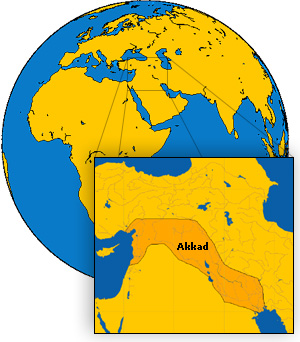|
The Great Ocean Conveyor Belt
by Daniel Grossman
part 1 2 3 4 5 6
 |
The Empire of Sargon of Akkad (2300 BCE) included parts of modern day Kuwait, Iraq, Syria, Turkey, and Lebanon.
|  |
Yale archaeologist Harvey Weiss is and expert on the once great Akkadian empire. - photo by Daniel Grossman |
Abrupt Climate Change to Blame?
Around 4,300 years ago, Mesopotamia was ruled by King Sargon - architect of the world's first great empire: Akkad. The kingdom stretched from what is now northeastern Syria and northern Iraq to the Persian Gulf.
"This was a kingdom whose merchants traveled at will across the expanse of the Near East," says archaeologist Harvey Weiss of Yale University, who has been excavating a northern outpost of the once-great empire for 25 years.
"In one of the famous descriptions of the empire, it is said that ships from far away across the Indus Valley brought their exotic materials to the harbor side of Akkad."
The civilization blossomed for a century. Then, Weiss explains, something terrible happened.
Approximately 4,200 years ago, the Akkadian empire vanished, an event known as the Akkadian Collapse, leaving only a three-foot layer of dust and sand.
The Curse of Akkad, an epic poem written down on cuneiform tablets about 100 years after the Akkadian collapse, appears to describe drought-induced famine.
The large fields produced no grain
The flooded fields produced no fish
The watered garden produced no honey and wine ...
He who slept in the house, had no burial
People were flailing at themselves from hunger.
"Most of the people who studied these documents considered this to be poetic metaphor," says Weiss.
A maverick among archaeologists, Weiss says the explanation is simpler.
"We in fact know that those were, in fact, the real world conditions out there."
He knows because Columbia University professor Peter deMenocal has studied the climate of Mesopotamia. More specifically, DeMenocal examined sea sediment in the Gulf of Oman.
"All of the sudden at about 4,200 years," explains deMenocal, "Something we can date very precisely, there is a very large and short-lived spike in the abundance of mineral dust that is actually transported from Mesopotamia. It was about a 300-year period of intensely drier conditions. It occurred at the same time as the societal collapse."
This was not just a dry spell. This was a 300-year drought. Societies all the way from present day Crete to India toppled. Even the Old Egyptian Kingdom, the society that built the great pyramids, crumbled. Peter deMenocal says big droughts at other times felled other societies, including the Yucatan's Mayan civilization about 1,200 years ago.
"Each one of these is a very good lesson for us. A lesson in humility. We are not above this."
Next - A Flip of the Switch
|

